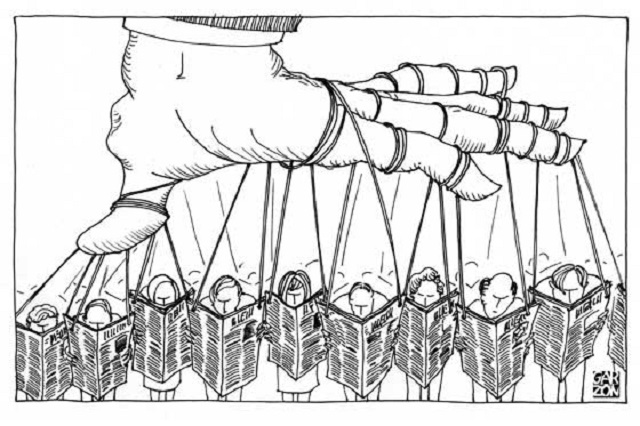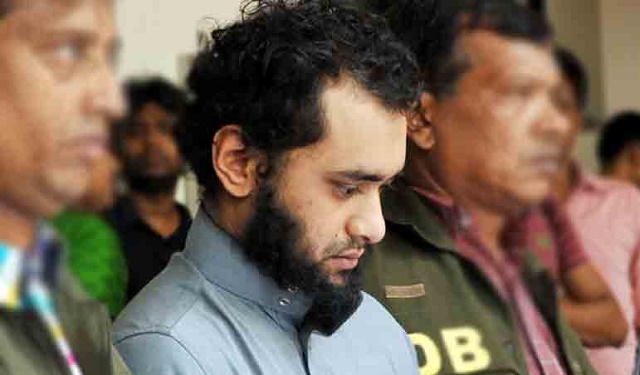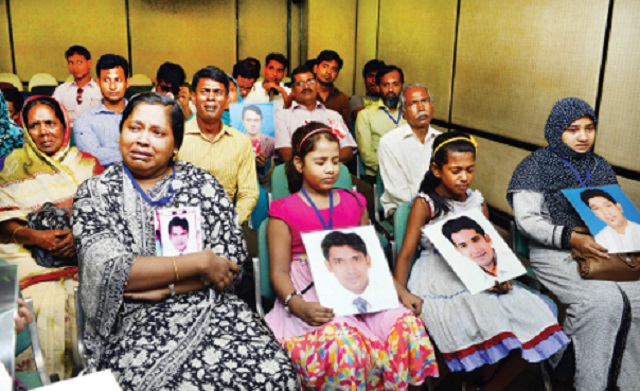A new front in the War on Terror in Bangladesh? The Avijit Roy Murder and the Manufacturing of Consent Special Report
New in Ceasefire, Special Reports - Posted on Wednesday, March 11, 2015 17:14 - 7 Comments
By The Brethren of Black Lotus

(Cartoon: ‘Media Control’, by Alfredo Garzon)
All unnatural deaths are worthy of sorrowful reflection by those who value and promote life and vitality, both in this world and the next. Although many people inside and outside Bangladesh no longer accept the government’s post-9/11 Bush and Cheney-scripted version of recent history, the influential international gallery is prone to taking the established narration and narrators at face value. Written in a context of wider state violence, we probe and challenge the impact and resonance provoked by one recent murder, that of Avijit Roy, which has gained the country international notoriety. Its gravity is such that it may signal either the end of the establishment’s remaining international and local esteem, and/or the beginning of a new wave of War on Terror-era repression and social control in Bangladesh.
On the 26th of February, Avijit Roy, a US citizen of Bangladeshi descent was murdered in Dhaka. He was born into a privileged and well-connected establishment family and educated as an engineer. He was confident in expressing his views, founding the electronic forum Mukto Mona back in 2001 with his father and others, mainly from the self-defining secularist wing of Bangladeshi society. At the time of writing, most media outlets are alleging that Roy was killed for his anti-religious views, and by religious fundamentalists. It would be fair to say that the story has displaced other Bangladesh concerns from the international public sphere.
Following the mass killings at the Bangladesh Rifles Headquarters in Pilkhana in 2009 and of protesters at the Shapla Chottor roundabout in Dhaka in May 2013, there is little expectation that there can be a fair, evidence-based, penetrating and thorough investigation from Bangladeshi state institutions of Roy’s murder. This is especially evident when government ministers are rushing to find their political opponents guilty of the crime, labelling them ‘terrorist’ and refusing to engage in dialogue with them. There has also been involvement from the U.S. Federal Bureau of Investigation, although internationalising of the issue presents its own problems, not least that credible and long-term solutions to our problems are better imagined, possessed and enacted from within.
Observing the situation surrounding the killing of Roy leaves many questions. These are being explored through social media, though not in the country’s ‘vibrant’ press and civil society. For example, regarding the (now banned) Ansarullah Bangla 7 Twitter account, which celebrated the grizzly killing, are there other outfits designated 1, 2, 3, 4, 5, 6 and 8? Who are its leadership? A few months back after a university professor was hacked to death, the same Ansarullah Bangla claimed responsibility immediately, but it transpired later that personal issues involving the professor’s personal practices may have been part of the motivation behind the killings.
The failure of law enforcement is a critical issue here. Why did the police, deployed in large numbers for the national book fair, not stop the attack? How is it that the Mukto-Mona website was reportedly blocked in Bangladesh more than 2 hours before the murder? Very basic questions remain unanswered, despite the fact that the Bangladeshi intelligence services have demonstrated their capacity to intercept and block all phone and data communications, and can successfully apprehend any person that mocks the Prime Minister on social media.
The Political Economy of the Media Coverage
The outrage over this murder, and the ensuing media manipulation has been of a different order and scale than we are used to in Bangladesh in recent years. Ideological outlooks seem to be very much channeling the ghosts of the Charlie Hebdo Hypocrisy which, above all, seems destined to provide semantic cover for further government crackdowns on political opponents, and a louder invitation to international ‘partners’ to join the party. Yet again, the ‘War on Terror’ will rear its hydra-head as a means of social control to keep the population in check and on message. The same media manipulation and ‘War on Terror’ social control technique were used just before the 2013 Dhaka Massacre, when the mood was created for panic, polarisation and consent for a brutal government crackdown and massacre of unarmed protesters.
It is uncanny that in the days and weeks before the killing, several op-ed pieces were trailed in the corporate media talking about ‘trigger points’ to an eventual, rising Islamist takeover. The articles also implied links between the nationalist BNP opposition party and Islamist militant activities. And so, before the blood of Avijit Roy had dried on the pavement, and any attempt at independent investigation had begun, the same corporate media pointed to Islamists, without even attending to the fact that police witnessed and failed to intervene in the attack. The Daily Star going so far as to pin the responsibility of the murder on Hizb-ut-Tahrir, a non-violent but banned political organisation in Bangladesh, but which operates freely, if awkwardly, in many western democracies.
Immediately following the event we saw a coordinated message of Bangladesh and its ‘secular’ government on the frontline of the ‘War on Terror’ pushed into the international press. Manipulation of the press on this issue, is not confined to Bangladesh, but extends internationally through a school of ‘Native misInformants’ who mislead international organs for petty and parochial gains, and to the detriment of both publics. In addition, the international press can be manipulated by structural interests that go above and beyond Bangladesh, influencing their coverage of the regional neighbourhood and political diversity.
Guardians of the (neo)Liberal Order
To demonstrate this important issue of grave misrepresentation, the contribution of the Guardian’s ‘investigative’ journalist in Dhaka, Saad Hammadi, is worth scrutinising, as the Guardian is emblematic of many of the prejudices that the post 9/11 British establishment and a Native misInformant can share. Hammadi’s move is threefold, and begins by linking the murder to legally constituted Islamic parties, which are present in both governing and opposition coalitions. Secondly, an alarming, even paranoiac, scenario of an imminent existential threat to the secular state constructed. With the perpetrator and the battlefront defined, the final play is to populate it with a false heroic binary of the current Prime Minister Sheikh Hasina resisting calls for blasphemy laws by Islamists.
The piece is in an established tradition of media manipulation of Bangladesh affairs to an international audience. It is well passed its sell-by date and long due for accountability. First, no religious groups in Bangladesh are calling for new blasphemy laws. What they were demanding, was that existing laws against hate speech be administered and rulings in such matters by the common law courts be enforced by the executive. Second, such laws have been in the past been enforced by Prime Minster Sheikh Hasina. Third, there is no existential threat to the secular state, as all political participants, including the Islamist parties, recognise and adhere to the constitution. In addition, there has been no terrorist attack in the country for more than half a decade.
This is not the first time the Guardian’s editorial policy has been prone to influence by powerful forces and gatekeepers. Recently, they sacked a Muslim environmental journalist for writing a critical but factual article on Gaza’s gas. Somewhat more subtly, it is known to censor development orientated articles that implicate its Bill and Melinda Gates Foundation sponsors lobbying for outrageous population control practices like mass sterilisation in India.
Deja Vu: The ‘framing’ of the London Cab Operator Samiun Rahman

Arrested Londoner Samiun Rahman.
Avitit Roy’s murder is not the first time either that the Guardian newspaper and its investigative reporter Saad Hammadi have run a story on Bangladesh and its ‘War on Terror’ theatre. On the 29th of September 2014, it ran a piece on a British man arrested in Bangladesh alleged to have confessed to being an ISIS recruiter. The headline to the article actually stated, “Briton arrested in Bangladesh ‘confessed to recruiting’ for Isis”. It was timed perfectly to underline Prime Minister Sheikh Hasina’s terrorism and extremism message at the 69th Session of the United Nations General Assembly.
Discrepancies were pointed out immediately after the story ran, yet five months on the Guardian’s original piece remains unamended. Another Dhaka-based journalist, this time the Telegraph’s correspondent David Bergman, spoke to Samiun Rahman in court, who claimed he was innocent, and that he had participated in one of the many aid convoys to Syria. After returning to the UK he had been interviewed by the security services and released, hence cleared of any wrongdoing. Bergman also pointed out procedural discrepancies in Samiun’s initial bail hearing and detention. Samiun attended the hearing without any legal representation and when he asked to represent himself, the magistrate refused. As such, he did not have the opportunity to profess his innocence.
Following the scent of something fishy, the UK-based investigative reporter Robert Verkaik decided to look into the Samiun Rahman case more closely. Verkaik has substantial experience investigating and writing about victims of the miscarriages of justice that litter ‘The War on Terror’. His Independent article revealed that Samiun went to Bangladesh in order to settle a family dispute, and since being arrested he had been threatened with torture, and the family forced to pay a ‘torture bribe’. Human rights campaigners CAGE commented that the case was full of holes and appeared to be stage managed for the benefit of the media.
There is growing incredulity at the media and government machinations over Bangladesh coverage in recent years. Other important public interest issues are affected indirectly too. Many will recall the miraculous rescue of a young sewing machinist, Reshma Begum, 17 days after the Rana Plaza Garments Factory collapsed, it was reportedly a hoax (strenuously denied) used to manipulate the public mood and distract from the state crime that took place in Dhaka on 5th and 6th May 2013.
Credibility and integrity are qualities that take significant time to earn and recognise. They are easily lost through breaches in ethics, and fear can only govern for so long. As the government and its growingly desperate dependants, push their twisted frontiers further, people and organisations of conscience and sound mind are less prepared to follow their piper’s tune, and are seeing things differently.
Taking the power back: Cultivating an inclusive and fertile resistance
Avijit Roy’s death and Bangladesh are bit part players in a wider staged-managed play. In their seminal Manufacturing Consent: The Political Economy of the Mass Media published towards the end of the Cold War, Chomsky and Herman argued that the mass media are effective and powerful ideological institutions that carry out system-supportive propaganda. Since the end of the Cold War, Chomsky has gone on to say that the ‘War on Terror’ has replaced anti-communism as the major social control mechanism.
Bangladesh is a deeply polarised society, ripe for manipulation and control through fear and mistrust. The divisions and polarities go to the very roots of its first encounters with modernity and colonialism, which created deep and resilient inequalities in opportunities and the right to be heard in the public sphere. Through the 19th century, social conditions conferred a communal identity, genealogy and experience to these inequalities. Ever since universal (re)enfranchise, there has been a gradual shift in the opposite direction, with new opportunities for alternative voices to be sustained, seen and heard. However, these breaches in the wall have not, as yet, translated into a full transfer of power.
If we look into the different social responses to these inequalities of being and knowing, one powerful trend is the pursuit of power; the creation of subdivisions, entrenchment and the further stifling of voices. We observe this happening with the ideological territorialisation of Avijit Roy’s murder, which stands in clear view as a postmodern Export Processing Zone, manufacturing consent for future regimes of control over our bodies, traditions, intellects and horizons.
Alternative trends are visible throughout our histories, though not always in plain view. They reflect the greater, human endeavour to seek the truth and build bridges of understanding, inviting us away from apathy and propaganda into a more just and dialogical space. Significant acts of listening and solidarity across positions can lead to encounters with positions that might appear to be cast in lead but are in reality made from more mutable matter.
An inclusive public sphere and discourse is the deepest fructifying protection to manipulation and fanaticism. It requires a new aptitude and openness to learn with each other’s knowledge traditions, spirituality or lack thereof.
“And speak unto him a gentle word…”
Quran 20:44
[Discourse between God and the Prophet Moses (as) on the manner of addressing Pharaoh]

The missing picture at the Guardian: Families of the victims of state crimes, resulting from enforced disappearances and extrajudicial killings in Bangladesh. Dhaka, September 2014.
7 Comments
biv
akhtersito
Biv, you sound so naive and ridiculously uninformed about the so-called “war on terror”. Let me help you get educated on the subject. By the way, there is no “Islamist atrocities” as you mentioned but all manufactured crisis on Muslim lands. So, yes, all the countries you’ve mentioned, are victims of false flag operations. If you want to get informed, rather than chanting along with the MSM, check this out:
Project for New American Century — a neo-con master plan for world domination.
Google is your friend.
Happy learning
biv
I know there are many, many people like akhtersito who believe in conspiracy theories (the Jews! the Jews!) but what I want to know is if the author of this piece does.
Because I think Fug is actually quite intelligent. I think he doesn’t believe that there are no Muslims that can be held responsible for their actions, they are all victims.
People who believe that Muslims cannot be responsible for any atrocities, please tell me: are Muslims more like animals, who can only react, or more like infants, who don’t know the difference between right and wrong?
By the way, what are Muslim lands? Do you think there are also Hindu, Christian, Buddhist, and Jewish lands too? You apologist for ethnic cleansing.
Sher Khan
biv,
Which article are you reading? the article makes no references to Jews nor does it make the statement that Muslims are not involved in atrocities. The whole article is about how the ‘War on Terror’ in general, and Bangladesh in particular, is trying to be used as means of social control and stamp out political pluralism and Human Rights.
The article cites in details two examples of media manipulation by the Government of Bangladesh, running with global war on terror theme for petty local political gains and cover, for widespread human rights abuse.
What are you on about? and who is Fug?
Blogger Osayqur’s death: Some lives are more valuable than others » Talukder Shaheb's Blog
[…] underlying connection with the Charlie Hebdo attacks in particular and with a rapidly developing new front of terror in the region is not lost on the […]
Militant Atheism, Madrasahs and Bangladesh: Midnight at the Noon of Golden Bengal | Nuraldeen
[…] of what Bangladesh means. Avijit was the joint founder of the website Mukto Mona, and was slain in mysterious circumstances in February 2015. The Bangladesh government of the day as well the corporate media has blamed the […]
[…] of what Bangladesh means. Avijit was the joint founder of the website Mukto Mona, and was slain inmysterious circumstances in February 2015. The Bangladesh government of the day as well the corporate media has blamed the […]


Oh my, a false flag operation! Do tell. Was 9/11 an inside job too? Could you make a list of which Islamist atrocities in Bangladesh, Pakistan, Nigeria, Iraq, Yemen, the Philippines, Sudan and Libya are also false flag operations? And do you think they are carried out by Jews, or what? Oh my.